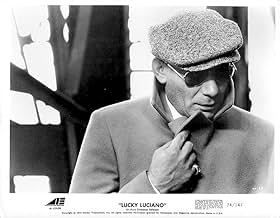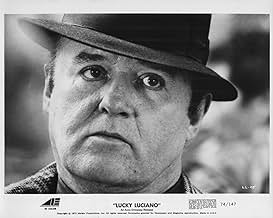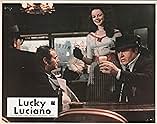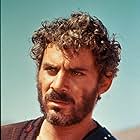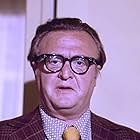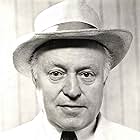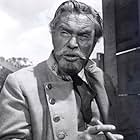IMDb RATING
6.4/10
1.6K
YOUR RATING
Biopic of Mafia boss Lucky Luciano, covering his life from 1946 to 1962 with occasional flashbacks.Biopic of Mafia boss Lucky Luciano, covering his life from 1946 to 1962 with occasional flashbacks.Biopic of Mafia boss Lucky Luciano, covering his life from 1946 to 1962 with occasional flashbacks.
- Awards
- 2 wins & 2 nominations
Edmond O'Brien
- Commissioner Harry J. Anslinger
- (as Edmund O'Brien)
Storyline
Did you know
- TriviaThe mass murder of forty mob bosses on 11 September 1931 depicted in the film became to be known as the ""Night of the Sicilian Vespers".
- GoofsWhen Lucky Luciano is deported in the mid-Forties, far more modern buildings can be seen on the New York skyline.
- ConnectionsFeatured in Neapolitan Diary (1992)
Featured review
This is the real story behind Lucky Luciano , born Salvatore Lucania November 24, 1897 – January 26, 1962, the high priest of crime , the detailed account the world's most powerful mobster who built an empire on a sea of blood . This international co-production by Italy/US/France deals with the deported crime boss who is sent back to Italy . This picture is plenty of mayhem , strong stuff , drama and amount of gangland violence . Biographic movie about the notorious kingpin Lucky Luciano , though depiction is about the final years , including various flashbacks . Lucky is one of the bosses of the Mafia and leader of Cosa Nostra or Mafia, and soon became a chief in the Reina Family during the height of the Castellammarese War. Then takes place a Mafian War between Salvatore Maranzano, who eventually defeated the faction headed by rival Joseph Masseria . After Masseria's murder , this position was short-lived, as Maranzano himself was murdered in 1931 . Then , the family is headed by Charles "Lucky" Luciano , eventually known as the Genovese Family. He orders the slaughter of 40 other responsible , a famous massacre nicknamed Sicilian Vespers , therefore becoming the only boss. But a few years later he is put into jail.
This landmark mobster movie is strong stuff , being dominated by the tenacious acting of Gian Maria Volonte as the gangster of the title who follows his way venomously since his US expulsion through criminal career in Naples and Sicily . As trivia , previous Federal Narcotics Agent Charles Siragusa , Lucky's real-life nemesis , plays himself . There appears several known gangsters as Vito Genovese well played by Charles Cioffi and the informer named Giannini rightly performed by Rod Steiger . Director Francesco Rosi's body-strewn look at the feud between gangsters , Commissioners and Judges, , but especially concerns about Lucky Luciano given a good interpretation by Volonte . This is a violence-ridden story full of action, drama, thriller , suspense but being overlong . The notorious gangster Lucky Luciano is splendidly played by Gian Maria Volonte who makes a good character study of one of the most colorful mobsters of the history . Glimmer and evocative cinematography by Pasqualino De Santis , though being necessary a correct remastering . Adequate and atmospheric musical score by Piro Piccioni .
The motion picture is well based on true events : Lucky Luciano was an Italian-born, naturalized American mobster born in Sicily. Luciano is considered the father of modern organized crime in the United States for splitting New York City into five different Mafia crime families and the establishment of the first Commission. He was the first official boss of the modern Genovese crime family. He was, along with his associate Meyer Lansky, instrumental in the development of the National Crime Syndicate in the United States. On January 3, 1946, as a presumed reward for his alleged wartime cooperation, now Governor Thomas E. Dewey reluctantly commuted Luciano's pandering sentence on condition that he does not resist deportation to Italy. As two federal immigration agents transported Luciano from Sing Sing prison to Ellis Island in New York Harbor for deportation proceedings . In Italy and Sicily begins becoming one of the chief of the Mafia. The US Army seems to refrain from interfering his business . But in 1946, Luciano secretly moved to Havana, Luciano's objective in going to Cuba was to be closer to the United States so that he could resume control over American Cosa Nostra operations and eventually return to the United States. Meyer Lansky was already established as a major investor in Cuban gambling and hotel projects . In October 1963, Valachi had testified before Subcommittee on Investigations of the U.S. Senate Committee on Government Operations that the Mafia did exist . Although Valachi's disclosures never led directly to the prosecution of many Mafia leaders, he was able to provide many details of its history, operations and rituals, as well as naming many members and the major crime families , Luciano among them . With the death of Maranzano, Luciano became the dominant organized crime boss in the United States. He had reached the pinnacle of America's underworld, directing criminal rules, policies and activities along with the other family bosses. Luciano also had his own crime family, which controlled lucrative criminal rackets in New York City such as illegal gambling, bookmaking, loan-sharking, drug trafficking and extortion. Luciano became very influential in labor and union activities and controlled the Manhattan Waterfront, garbage hauling, construction, Garment Center businesses and trucking.
This landmark mobster movie is strong stuff , being dominated by the tenacious acting of Gian Maria Volonte as the gangster of the title who follows his way venomously since his US expulsion through criminal career in Naples and Sicily . As trivia , previous Federal Narcotics Agent Charles Siragusa , Lucky's real-life nemesis , plays himself . There appears several known gangsters as Vito Genovese well played by Charles Cioffi and the informer named Giannini rightly performed by Rod Steiger . Director Francesco Rosi's body-strewn look at the feud between gangsters , Commissioners and Judges, , but especially concerns about Lucky Luciano given a good interpretation by Volonte . This is a violence-ridden story full of action, drama, thriller , suspense but being overlong . The notorious gangster Lucky Luciano is splendidly played by Gian Maria Volonte who makes a good character study of one of the most colorful mobsters of the history . Glimmer and evocative cinematography by Pasqualino De Santis , though being necessary a correct remastering . Adequate and atmospheric musical score by Piro Piccioni .
The motion picture is well based on true events : Lucky Luciano was an Italian-born, naturalized American mobster born in Sicily. Luciano is considered the father of modern organized crime in the United States for splitting New York City into five different Mafia crime families and the establishment of the first Commission. He was the first official boss of the modern Genovese crime family. He was, along with his associate Meyer Lansky, instrumental in the development of the National Crime Syndicate in the United States. On January 3, 1946, as a presumed reward for his alleged wartime cooperation, now Governor Thomas E. Dewey reluctantly commuted Luciano's pandering sentence on condition that he does not resist deportation to Italy. As two federal immigration agents transported Luciano from Sing Sing prison to Ellis Island in New York Harbor for deportation proceedings . In Italy and Sicily begins becoming one of the chief of the Mafia. The US Army seems to refrain from interfering his business . But in 1946, Luciano secretly moved to Havana, Luciano's objective in going to Cuba was to be closer to the United States so that he could resume control over American Cosa Nostra operations and eventually return to the United States. Meyer Lansky was already established as a major investor in Cuban gambling and hotel projects . In October 1963, Valachi had testified before Subcommittee on Investigations of the U.S. Senate Committee on Government Operations that the Mafia did exist . Although Valachi's disclosures never led directly to the prosecution of many Mafia leaders, he was able to provide many details of its history, operations and rituals, as well as naming many members and the major crime families , Luciano among them . With the death of Maranzano, Luciano became the dominant organized crime boss in the United States. He had reached the pinnacle of America's underworld, directing criminal rules, policies and activities along with the other family bosses. Luciano also had his own crime family, which controlled lucrative criminal rackets in New York City such as illegal gambling, bookmaking, loan-sharking, drug trafficking and extortion. Luciano became very influential in labor and union activities and controlled the Manhattan Waterfront, garbage hauling, construction, Garment Center businesses and trucking.
- How long is Lucky Luciano?Powered by Alexa
Details
Contribute to this page
Suggest an edit or add missing content




